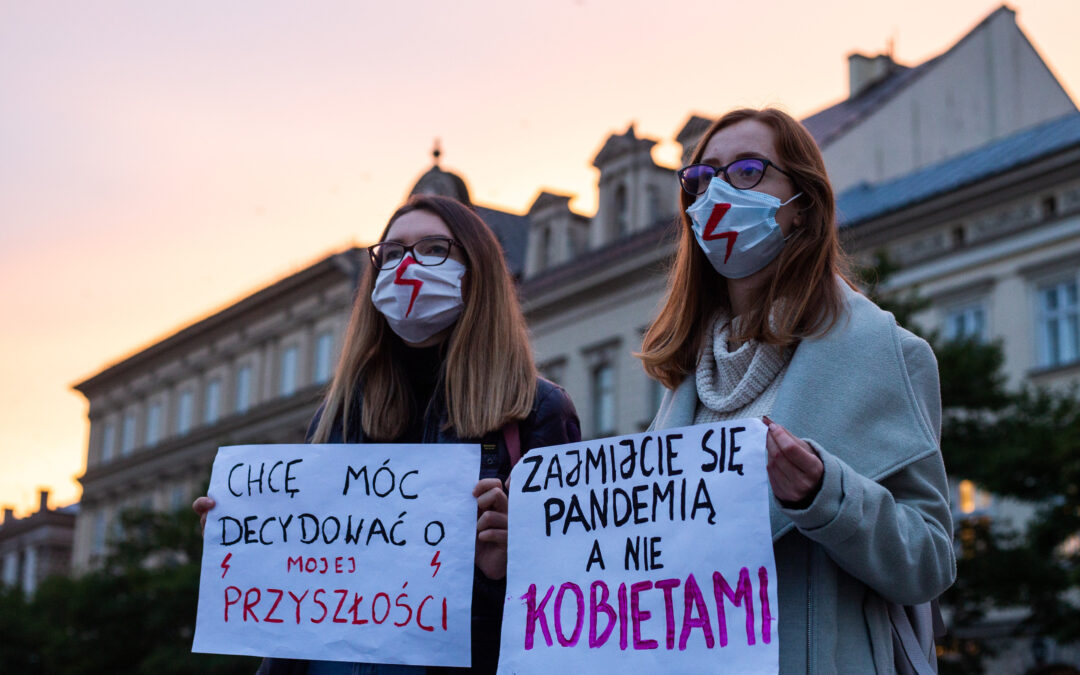Poland’s Constitutional Tribunal has issued a ruling that will virtually end legal abortion in Poland. It has found that abortion in cases where the foetus has serious and irreversible birth defects – which make up around 98% of all legal terminations in Poland – is unconstitutional.
The effect will be to further tighten Poland’s abortion law – already the strictest in the European Union other than Malta’s – by leaving women entitled to legal terminations only if the pregnancy threatens their life or health, or if it results from an illegal act such as rape or incest.
Today’s ruling has been met with condemnation from women’s rights groups, as well as the centrist and left-wing parliamentary opposition, who accuse the government of “legalising torture through the back door”.
Although the decision was made by judges at the Constitutional Tribunal, commentators note that the institution is under the influence of the ruling national-conservative Law and Justice (PiS), whose leaders have publicly called for an end to what they label “eugenic abortion”.
PiS in 2016 appointed its own judges to the tribunal instead of those legitimately nominated under the previous government. It also engineered its candidate, Julia Przyłębska, a close associate of PiS chairman Jarosław Kaczyński, into the presidency of the tribunal in breach of procedures.
In December 2019, a group of 119 members of parliament submitted a request to the tribunal to assess whether abortion carried out due to serious and irreversible birth defects contravenes four constitutional principles: human dignity, the right to life, the prohibition of discrimination, and the democratic rule of law.
The MPs, mainly from PiS but also from the far-right Confederation (Konfederacja) and centre-right PSL-Kukiz’15 coalition, argued that it does.
Today, the court agreed with them. “The tribunal maintains the position that human life is of value at every stage of development and should be protected,” said the court’s rapporteur, Justyn Piskorski, when announcing the ruling.
“A child in the prenatal period of life, as a human being who is entitled to inherent and inalienable dignity, is an entity having the right to life, and the legal system must guarantee the proper protection of this,” continued Piskorski, quoted by Onet.
The decision to refer the case to the Constitutional Tribunal came after PiS’s leadership had faced mounting criticism from conservatives, including the Catholic church, for not having followed through on its previous promises to legislatively outlaw such abortions.
Kaczyński had said that his party would “strive to ensure that even very difficult pregnancies, when the child is condemned to death, is severely deformed, will end in birth, so that the child can be christened, buried, given a name”.
However, when legislative proposals to tighten the abortion law came to parliament in 2016 and 2018, PiS backed away from them after mass “black protests” by women. Opinion polls suggest that 45-50% of Poles prefer to keep the existing law. Only 10-15% favour further restricting it, while around 30-40% want it to be liberalised.
Sending the abortion issue to the Constitutional Tribunal is seen by many commentators as a way for PiS to introduce the abortion restrictions without having to take direct political responsibility.
Artur Dziambor, a Confederation MP, said that today “the Constitutional Tribunal did what PiS did not want to do in parliament”, but he nonetheless celebrated that “life has won”.
Scenes from protests today in front of the Constitutional Tribunal in Warsaw, before a ruling that effectively bans abortion in Poland. pic.twitter.com/fSTexdRw38
— Joanna Plucinska (@joannaplucinska) October 22, 2020
Today’s ruling has already prompted protests. However, because of recently introduced coronavirus restrictions limiting public gatherings to 10 people, women have demonstrated on a rotational basis outside the Constitutional Tribunal.
“PiS MPs decided to use a politicised Constitution Tribunal to condemn women to give birth to children unable to survive,” said Agnieszka Dziemianowicz-Bąk, an MP of the Left. “Instead of a debate in parliament on women’s rights, they decided to legalise torture through the back door.”
Borys Budka, leader of the largest opposition party, the centrist Civic Platform (PO), said that the “pseudo-tribunal, taken over by PiS, with no right to issue rulings, has carried out the political order of Jarosław Kaczyński”.
He described the court’s ruling today as “inhuman”, and said that it will create “hell for Polish women”, reports TVN24.
Removing the basis for almost all legal abortions in #Poland amounts to a ban & violates #HumanRights. Today’s ruling of the Constitutional Court means underground/abroad abortions for those who can afford & even greater ordeal for all others. A sad day for #WomensRights.
— Commissioner for Human Rights (@CommissionerHR) October 22, 2020
The tribunal’s decision was, however, welcomed by President Andrzej Duda, a PiS ally. “We are pleased that the Constitutional Tribunal has taken the side of life,” said Duda’s spokesman, Błażej Spychalski, quoted by TVN24.
The children’s rights commissioner, Mikołaj Pawlak, a PiS appointee, has also expressed support for restricting the abortion law. He argues that “eugenic” abortion amounts to “denying the right to life” as it “allows for the killing of an unborn child solely on the basis of suspicion of a serious disease”.
Pawlak noted that the current law allows for termination in the case of abnormalities such as Down syndrome, which “millions of people live with”. He also observed that the number of abortions has been steadily rising, from 499 in 2008 to 1,110 in 2019, reports Polska Times.
A number of Polish and international human rights groups have appealed against the tightening of current restrictions.
In a joint statement ahead of today’s court session, Amnesty International, the Center for Reproductive Rights, and Human Rights Watch said they would be sending “independent expert monitors” to Poland given their “longstanding concern about the human rights of women and girls”.
“The Constitutional Tribunal’s upcoming proceedings take place in the context of repeated government attacks on women’s rights and efforts to roll back reproductive rights, as well as legal and policy changes that have undermined the independence of the judiciary and rule of law in Poland,” said the statement.
According to the latest version of the annual Contraception Atlas, created by the European Parliamentary Forum for Sexual and Reproductive Rights, Poland has the worst access to contraception in Europe.
In May, the government awarded an honour to pro-life activist, Zuzanna Wiewiórka, who prevented a teenager from having an abortion by informing the girl’s parents about her plans. Critics, however, say that Wiewiórka violated the girl’s privacy and harassed her online.
Polish government honours pro-life activist who stopped teen having abortion by informing her family
Before today’s ruling, Poland’s current abortion law, passed in 1993, permitted termination of pregnancy under only three circumstances: when pregnancy threatens the woman’s life or health; if pregnancy is the result of a criminal act (such as rape or incest); or if the foetus is seriously malformed.
The vast majority of the 1,000 or so legal abortions that take place in Poland each year are, however, carried out due to foetal abnormalities. In 2019, this was the reason cited for 1,074 of 1,110 legal abortions.
It is believed that a far higher number of illegal abortions take place – between 80,000 and 150,000 a year, according to women’s rights groups. Many Polish women also travel to neighbouring countries with more liberal abortion laws – such as Germany and Slovakia – to obtain terminations.
Main image credit: Adrianna Bochenek/Agencja Gazeta

Maria Wilczek is deputy editor of Notes from Poland. She is a regular writer for The Times, The Economist and Al Jazeera English, and has also featured in Foreign Policy, Politico Europe, The Spectator and Gazeta Wyborcza.




















